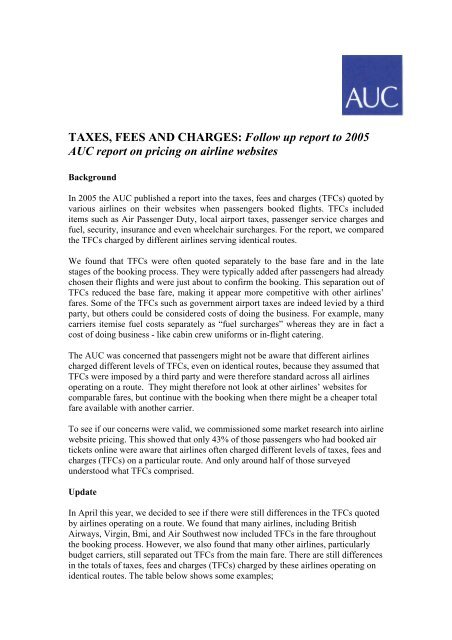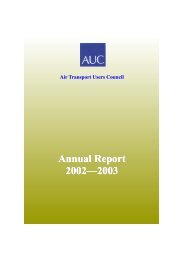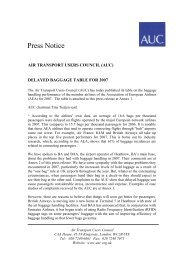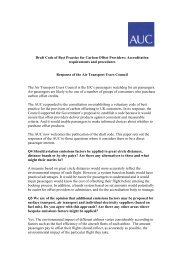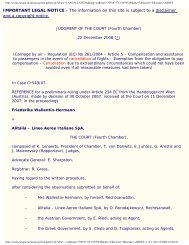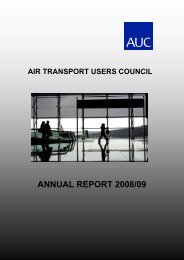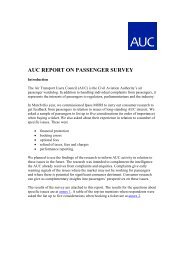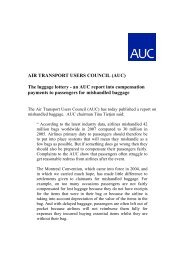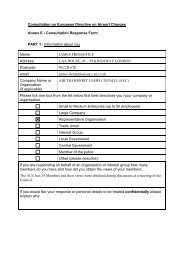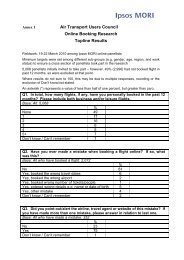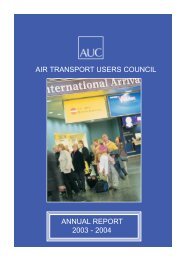TAXES, FEES AND CHARGES: Follow up report to - Air Transport ...
TAXES, FEES AND CHARGES: Follow up report to - Air Transport ...
TAXES, FEES AND CHARGES: Follow up report to - Air Transport ...
You also want an ePaper? Increase the reach of your titles
YUMPU automatically turns print PDFs into web optimized ePapers that Google loves.
<strong>TAXES</strong>, <strong>FEES</strong> <strong>AND</strong> <strong>CHARGES</strong>: <strong>Follow</strong> <strong>up</strong> <strong>report</strong> <strong>to</strong> 2005<br />
AUC <strong>report</strong> on pricing on airline websites<br />
Background<br />
In 2005 the AUC published a <strong>report</strong> in<strong>to</strong> the taxes, fees and charges (TFCs) quoted by<br />
various airlines on their websites when passengers booked flights. TFCs included<br />
items such as <strong>Air</strong> Passenger Duty, local airport taxes, passenger service charges and<br />
fuel, security, insurance and even wheelchair surcharges. For the <strong>report</strong>, we compared<br />
the TFCs charged by different airlines serving identical routes.<br />
We found that TFCs were often quoted separately <strong>to</strong> the base fare and in the late<br />
stages of the booking process. They were typically added after passengers had already<br />
chosen their flights and were just about <strong>to</strong> confirm the booking. This separation out of<br />
TFCs reduced the base fare, making it appear more competitive with other airlines’<br />
fares. Some of the TFCs such as government airport taxes are indeed levied by a third<br />
party, but others could be considered costs of doing the business. For example, many<br />
carriers itemise fuel costs separately as “fuel surcharges” whereas they are in fact a<br />
cost of doing business - like cabin crew uniforms or in-flight catering.<br />
The AUC was concerned that passengers might not be aware that different airlines<br />
charged different levels of TFCs, even on identical routes, because they assumed that<br />
TFCs were imposed by a third party and were therefore standard across all airlines<br />
operating on a route. They might therefore not look at other airlines’ websites for<br />
comparable fares, but continue with the booking when there might be a cheaper <strong>to</strong>tal<br />
fare available with another carrier.<br />
To see if our concerns were valid, we commissioned some market research in<strong>to</strong> airline<br />
website pricing. This showed that only 43% of those passengers who had booked air<br />
tickets online were aware that airlines often charged different levels of taxes, fees and<br />
charges (TFCs) on a particular route. And only around half of those surveyed<br />
unders<strong>to</strong>od what TFCs comprised.<br />
Update<br />
In April this year, we decided <strong>to</strong> see if there were still differences in the TFCs quoted<br />
by airlines operating on a route. We found that many airlines, including British<br />
<strong>Air</strong>ways, Virgin, Bmi, and <strong>Air</strong> Southwest now included TFCs in the fare throughout<br />
the booking process. However, we also found that many other airlines, particularly<br />
budget carriers, still separated out TFCs from the main fare. There are still differences<br />
in the <strong>to</strong>tals of taxes, fees and charges (TFCs) charged by these airlines operating on<br />
identical routes. The table below shows some examples;
Route<br />
Stansted <strong>to</strong> Alicante<br />
Belfast <strong>to</strong> Ibiza<br />
Birmingham <strong>to</strong> Aberdeen<br />
Newcastle <strong>to</strong> Krakow<br />
Glasgow <strong>to</strong> Birmingham<br />
<strong>Air</strong>line<br />
TFCs<br />
(return flight)<br />
Easyjet £22<br />
Ryanair £38.93<br />
Easyjet £20<br />
Jet2 £29.20<br />
Flybe £51.30<br />
Bmibaby £37.90<br />
Jet2 £28<br />
Easyjet £21.50<br />
Bmibaby £38.95<br />
Flybe £50.30<br />
Conclusion<br />
There remains a risk that passengers are not aware that airlines charge different TFCs<br />
on a route and therefore might not look at other airlines’ websites <strong>to</strong> compare fares. In<br />
addition, passengers now have a further problem in that they must compare prices<br />
between those airlines that include TFCs in their prices and those that don’t.<br />
The solution is for all airlines <strong>to</strong> quote fares inclusive of TFCs on their websites. This<br />
would mean that passengers would be aware of what they would be paying in <strong>to</strong>tal <strong>up</strong><br />
front and be able <strong>to</strong> compare airline fares on a like for like basis and therefore would<br />
not be potentially misled in<strong>to</strong> booking with one particular carrier over another.<br />
Moreover, if all airlines were <strong>to</strong> do this then there would be no competitive advantage<br />
for one airline over another and they would have no incentive <strong>to</strong> separate out TFCs<br />
from the base fare.<br />
<strong>Air</strong> <strong>Transport</strong> Users Council (AUC)<br />
4 May 2007


